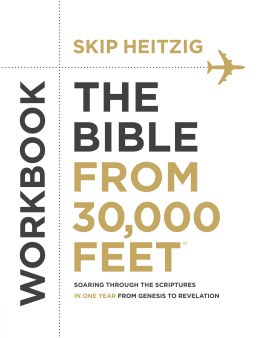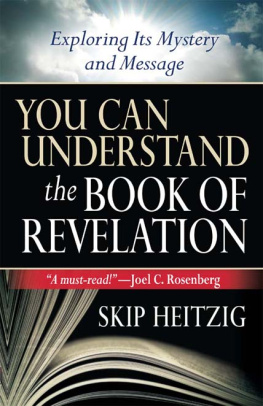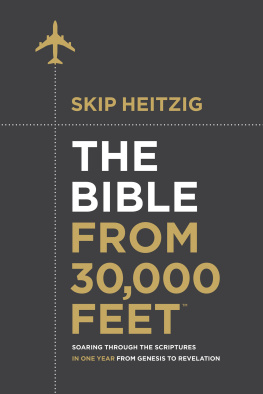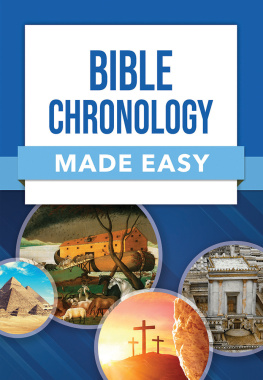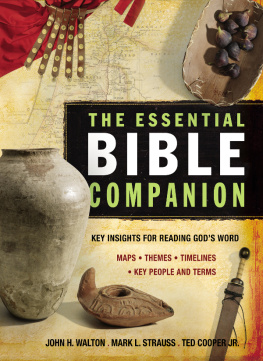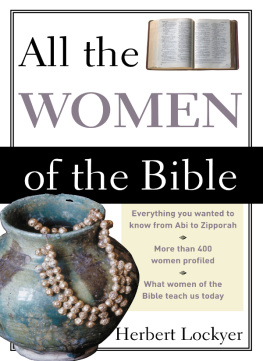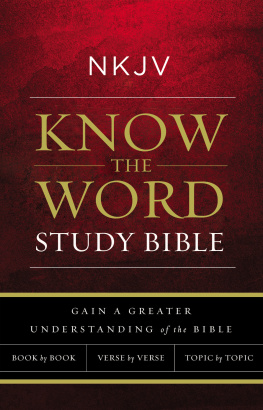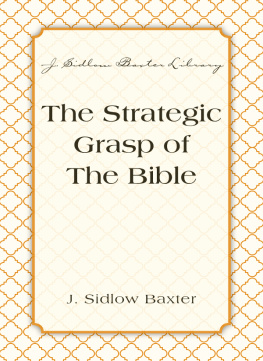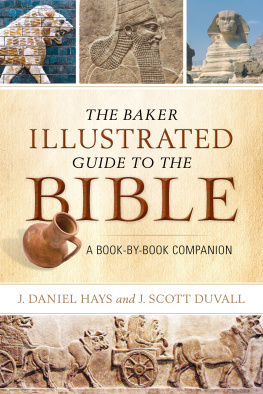Takeoff
Written by Moses sometime in the fifteenth century BC, Genesis is the first of the five opening books of the Biblealso known as the Law, the Torah, or the Pentateuch. Genesis is Gods inspired record of events and history as they actually happened. Moses wrote Genesis to remind Gods peoplethe Hebrewsof the origin of their people and Gods plan for them. The book covers the creation of the world, the origin of man, the fall, and how God began to work in His people through the lives of the patriarchs, establishing the history of the nation of Israel. Genesis also highlights the beginning of Gods plan of redemption for the human race (see Genesis 3:15). Understanding the foundational concepts in this book is crucial as you make your way through the rest of the Bible.
In Flight
The Formation (Genesis 12)
What did God think of what He created (see Genesis 1:31)? What does creation tell us about Gods character?
Read Genesis 1:26-27, 31; 2:18, 23-25; 3:8-11. What do these verses tell you about relationships, including the kind of relationship God had with Adam and Eve before the fall?
The Fall (Genesis 35)
Why did Eve eat the fruit of the tree (see Genesis 3:6)?
Read Romans 5:14-21. How did Adams actions affect all of mankind, including you?
Genesis 3:15 is the Bibles first prediction of the Messiah, also known as the womans Seed. What was predicted would happen to this Seed? What would happen to the serpent, Satan?
The Flood (Genesis 69)
Read Genesis 6:22. How do you respond when the Lord tells you to do something?
What covenant did God make with Noah and all of creation (see Genesis 8:20-22; 9:8-17)? What was its sign?
The Fallout (Genesis 911)
Has the Lord ever foiled your plans (see Genesis 11:5-8)? What did you learn from the experience?
What does the Tower of Babel incident in Genesis 11 tell you about how God deals with rebellion?
The Foursome (Genesis 1250)
Read Genesis 15. What was the general gist of the covenant God made with Abraham? How did Abraham react to it (see v. 6; see also Romans 4:20-22)?
Which person in Genesis do you find most interesting? What can you learn from that persons life and relationship with God?
Landing
Genesis contains some of the most popular and well-known stories in the Bible. The challenge is to personalize these stories, understand that theyre real accounts of real events that happened to real people, and learn practical lessons from them. Genesis shows us that God is the great Creator and Conductor, writing the score and leading the symphony of life according to His purposes. Our response to His power and sovereignty should be one of awe, worship, submission, and obedience.
Memento
I will put enmity between you and the woman, and between your seed and her Seed; He shall bruise your head, and you shall bruise His heel.
Genesis 3:15
Takeoff
Moses wrote Exodus in the fifteenth century BC. In it, he tells the story of how God miraculously freed the Hebrew people from servitude in Egypt and began to establish them as a nation. During this time, the Lord gave Moses His Law, including the Ten Commandments, and instructed the people to build the tabernacle, a dwelling place for His presence among them. Exodus can be divided into four sections: the Israelites bondage in Egypt, their liberation from that bondage, their introduction to the law, and their emerging identity as Gods people. Another important event in Exodus is the Passover, which foreshadowed the atoning sacrifice of Jesus Christ, the true Passover Lamb (see John 1:29).
In Flight
Domination: The Bondage of Egypt (Exodus 112)
Read Exodus 3:114:17. What excuses did Moses make for not obeying God? How did God respond to each excuse? What can you learn from this interaction?
In Judaism, part of observing the Passover is telling the story of Israels redemption by lambs blood and their deliverance (see Exodus 12). Write down a quick version of your redemption story (how you came to know Jesus), then share it with someone.
Liberation: The Barrenness of the Wilderness (Exodus 1318)
Just as God delivered the Hebrews from Egypt, Jesus Christ has delivered us from the grip of sin. Read Romans 6:14-19. How has this deliverance affected your daily life?
What shift in attitude occurred among the people in Exodus 15? What do you learn about Gods nature from this chapter?
The Bible is meant to be feasted upon daily, like manna (see Exodus 16:21). Write down a plan of action for reading the Word every day: the when, the where, and the what.
Revelation: The Bringing of the Law (Exodus 1920)
List each of the sins the Ten Commandments address (see Exodus 20:3-17).
Identification: The Birth Pains of the Nation (Exodus 2140)
Read Exodus 25:10-22. What was the purpose of the Ark of the Covenant?
The tabernacle shows that God wants to dwell among His peopleand that includes spending time with them. Take the next five minutes to pour out your heart to God in prayer, then devote a designated time to talk to Him every day.
Landing
The apostle Paul, speaking of the events of Exodus, said, All these things happened to [the Israelites] as examples, and they were written for our admonition (1 Corinthians 10:11). What happened 3400 years ago is as relevant today as it has ever been. God allowed the Hebrews to live in bondage in Egypt, then supernaturally orchestrated their deliverance. Think of how the Lord has worked out the details of salvation and spiritual growth in your life, then use that as a springboard to trust Him every day.
Memento
The blood shall be a sign for you on the houses where you are. And when I see the blood, I will pass over you; and the plague shall not be on you to destroy you when I strike the land of Egypt.
Exodus 12:13
Takeoff
Leviticus is the third book of the Torah, initially given to Moses by God at Mount Sinai (see Leviticus 25:1) and as Israel wandered through the wilderness. The name Leviticus indicates that Moses wrote the book specifically for the priests from the tribe of Levi, whose job and calling was to lead the worship life of Israel. Leviticus was the official book of information for proper worship rituals and the management of the tabernacle, as well as important aspects of Hebrew culture like feasts, the Day of Atonement, and the treatment of food, births, and sickness, all overseen by the priesthood. Overall, Leviticus focuses on Gods holiness and mans need for atonement, or forgiveness through purification and sacrifice.
In Flight
The Way to God Through Sacrifice (Leviticus 117)
Leviticus makes it clear that everybody needs forgiveness from God. If theres sin in your life that you need to confess to the Lord, do so right now.
Read 1 Peter 4:10-11. Like the Levites, God has a ministry for every single believer. Whats yours? If you arent sure, in what ways might you find out?
What happened to Nadab and Abihu in Leviticus 10:1-3? How does this illustrate the principle that the only worship God permits is the worship He prescribes?
God cares about our bodiesjust read Leviticus 1115! Whats a habit that keeps you from taking care of what God has given you? Once youve asked the Lord for deliverance, seek out other believers to help you kick this bad habit.
What does Leviticus 17 say about the importance of blood?
A Walk with God Through Sanctification (Leviticus 1827)
Leviticus 18 gives regulations for sexual morality. Read 1 Corinthians 6:18-20. What can you do to commit to a sexually pure life?
Multiple times in Leviticus, God called the Israelites to be holy as He is holy (see Leviticus 20:26, for example). What are some ways you can be holy (or set apart) from your culture for God?
Read Leviticus 22:29 and 2 Corinthians 9:6-8. What do these verses say about sacrifice and giving to the Lord?
Next page
